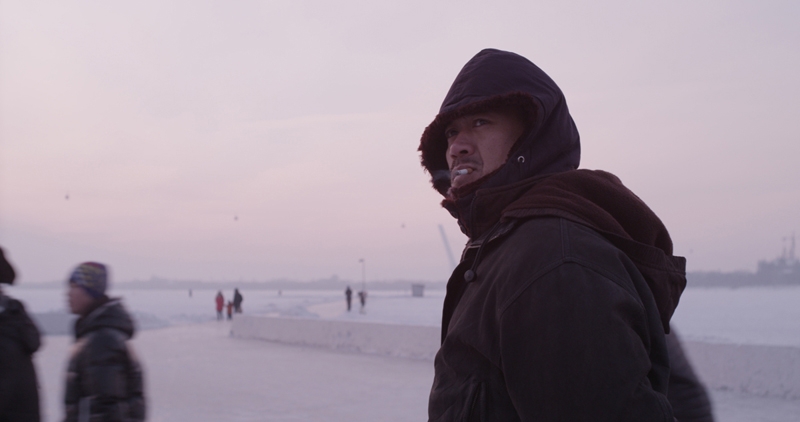The publicity campaign in mainland China for Black Coal, Thin Ice (2014), written and directed by Diao Yinan, began this year following the film’s award-winning showing at the Berlin International Film Festival. The selling points of the film, the Chinese title of which, Bai Ri Yan Huo, means daytime fireworks, were determined to be love and suspense – a characterisation that has become something of a joke. In truth the film has nothing to do with true love or genuine suspense; rather, it addresses a specific aspect of the frigid state of love in China.
The film follows a hostage, Wu Zhizhen, a young and beautiful laundry worker played by Gwei Lun-Mei, around whom a series of murders occurs. The principal male role goes to a disgraced excop, Zhang Zili, who hunts for her; other characters include Wu’s husband and various men in her life. The fact that the female protagonist in the film is a hostage is not only central to the plot but also to the creative libido of the filmmaker. Only a filmgoer with a robust imagination capable of filling in the blanks will appreciate the love Wu experiences in the film. From the moment that Zhang, played by Liao Fan, lays eyes on Wu, she might be understood as his quarry – an opportunity for professional redemption. But she is also a surrogate focal point for his stifled desire. The repression of Zhang’s sexuality is clearly portrayed from the onset: his wife leaves him, and the filmmaker places a lingering emphasis on the finality of their last sexual encounter, directly after which she gives him his divorce papers. It is also the film’s only complete sex scene – a result of the filmmaker’s psychological approach, not the censorship system.
Desire is completely repressed throughout, and its distorted or sublimated forms shape the film’s most brilliant moment: in broad daylight, Zhang launches fireworks pell-mell into the sky as a way of bidding farewell to the vanished woman. The China of the recent past becomes a romantic lament about repression
Zhang’s inhibition is Diao’s projection. Black Coal, Thin Ice is a film about repression, and the first scene depicts a vividly repressive atmosphere. A coal truck carrying a mysterious package trundles through the foreground; in the background, a military vehicle emits a resounding military song. If this were a film that contained a powerful exploration of love (though repressed), then it would start at some later point, perhaps one at which the male protagonist takes a date to ride on a Ferris wheel; a criminal investigation would not be the focus of the subsequent plot. And if love were allowed to develop, then the final scene would not be one of fireworks set off in the daytime. If Black Coal, Thin Ice were a film about love, then the imprisonment of women by Wu’s husband, Liang Zhijun (played by Wang Xuebing), would be more than an aspect of a criminal case; it would be a labyrinth of male desire and emotion, the counterpoint to the sterile world of the male protagonist. Similarly, if it were a film about love, then Wu would have something of her own initiative, rather than being solely the object of various imprisonments and molestations: from her client, one of the murder victims who had his fur coat washed in the laundry before his death, to her boss, the owner of the laundry, who is completely corrupted by desire; from her husband, who imprisons her through love, to the detective Zhang, who seeks in her the resuscitation of his shelved sexuality – in short, to every man in the film. The emotions and desires in Black Coal, Thin Ice are encapsulated in one scene, a rendezvous on a frozen lake: the beautiful Wu triggers the impulses of multiple men, spawning in their minds bilateral relationships with her, and their interactions with each other spawn further trilateral imaginings. In the rational mind of the oppressed male, people, in the big picture, become nothing more than dark shadows spun around on a quiet globe. In a libidinous male dark fantasy, desire is as sharp as an ice skate – sharp enough to cut throats. Thus Black Coal, Thin Ice forbids the occurrence of love. Desire is completely repressed throughout, and its distorted or sublimated forms shape the film’s most brilliant moment: in broad daylight, Zhang launches fireworks pell-mell into the sky as a way of bidding farewell to the vanished woman. The China of the recent past becomes a romantic lament about repression.
While Black Coal, Thin Ice contains symbolic visualisations of desire and its repression, any narrative exploration of the subject is largely sidelined. Instead, we see a filtered version of a Northeast China city become the original source of this visualisation, and the fragmentary images that cannot be authentically incorporated into the dramatic narrative only intensify the repressed atmosphere. Included among these fragments are an obese female bystander during a gunfight, a horse crossing a gloomy street and filmgoers in a shabby cinema, their glasses flickering in the darkness. This last example, a film within a film, the 1986 classic Lucky 13 (aka Sister Thirteen), contains typical martial-arts-movie fighting sounds that hark back to earlier times, piercing the estranged and filtered contemporary reality, and allowing Black Coal, Thin Ice to become a dirge for its epoch.
Translated from Chinese by Daniel Nieh. This article was first published in the Autumn & winter 2015 issue of ArtReview Asia.
